Fireweed continues to grow Boundary Zone with multiple wide, high-grade zones of zinc-lead-silver mineralization in step-out holes within stratiform, laminated to massive sulphides, which demonstrate strong continuity of the system, and potential for further step-outs of the mineralized zones.
- Hole NB23-016 intersected 81.3 m (35 m estimated true width) of 8.5% zinc, 1.1% lead, and 47.0 g/t silver, including 12.4 m of 17.2% zinc, 2.0% lead, and 79.1 g/t silver. This hole also intersected a separate interval of 12.84 m grading 4.5% zinc and 8.8 g/t silver.
- Hole NB23-012 intersected 67.78 m (41 m estimated true width) grading 6.3% zinc, 1.2% lead, and 52.0 g/t silver including 10.52 m of 12.8% zinc, 2.3% lead, and 105.7 g/t silver.
- Hole NB23-011 intersected 44.83 m (8.5 m estimated true width) grading 8.3% zinc, 1.2% lead, and 42.9 g/t silver including 18.83 m of 12.2% zinc, 1.3% lead, and 63.9 g/t silver.
- Assays are pending for 24 remaining drillholes from Boundary Zone, 10 holes from the Tom deposit and 2 holes from the Jason deposit.
Vancouver, British Columbia: FIREWEED METALS CORP. (“Fireweed” or the “Company”) (TSXV: FWZ; OTCQB: FWEDF; FSE: M0G) is pleased to report additional assay results from its 2023 exploration at the Macmillan Pass (“Macpass”) Project, Yukon, Canada, and provide an update from its largest ever drill program.
CEO Statement
Brandon Macdonald, CEO, stated, “We are delighted by the continued demonstration of scale, strength, and continuity of mineralization at the Boundary Zone. The results today further illustrate the significance of Boundary Zone within the Macpass Project. Critically, the recent results give us a clearer picture of the geometries of the stratiform massive sulphide zones and surrounding vein, breccia, and replacement style mineralization. We have now completed our largest ever drill program, which has started to reveal the true scale of the mineralization at Boundary Zone and we eagerly await many more results from Boundary Zone, and the Tom and Jason deposits.”
Results from Boundary Zone
Following up on drilling from 2022 and the compelling initial results of the 2023 program to date, Fireweed continues to test the extents of the high-grade feeder zone target. This zone is interpreted to occur as at least one tabular layer within a broader sediment hosted massive sulphide system. Drilling also continues to define the more distal expressions of this stratiform system near surface, as well as delineating the extensive replacement, vein, and breccia styles of mineralization. The results from 2023 continue to return high-grade zinc values that support the stratiform mineralization model, as well as better defining the vein, breccia and replacement mineralization near surface.
Table 1: Assay highlights for holes 011 to 016 of the 2023 drilling program, Boundary Zone.
|
Drillhole |
Interval |
From (m) |
To (m) |
Interval Width (m) |
Est. True Width (m) |
Zinc (%) |
Lead (%) |
Silver (g/t) |
Bulk Density (t/m3) |
|
NB23-011 |
Primary |
204.5 |
249.3 |
44.83 |
8.5 |
8.3 |
1.2 |
42.9 |
3.2 |
|
NB23-011 |
Including |
204.5 |
223.3 |
18.83 |
3.6 |
12.2 |
1.3 |
63.9 |
3.5 |
|
NB23-011 |
>Including |
208.5 |
214.5 |
6.00 |
1.1 |
20.7 |
2.3 |
107.8 |
3.5 |
|
NB23-012 |
Primary |
223.5 |
291.3 |
67.78 |
41 |
6.3 |
1.2 |
52.0 |
3.9 |
|
NB23-012 |
Including |
223.5 |
279.1 |
55.57 |
34 |
7.2 |
1.4 |
57.1 |
3.9 |
|
NB23-012 |
>Including |
223.5 |
234.0 |
10.52 |
6.3 |
12.8 |
2.3 |
105.7 |
3.8 |
|
NB23-012 |
>>Including |
225.5 |
231.0 |
5.52 |
3.3 |
16.7 |
3.1 |
136.2 |
4.0 |
|
NB23-012 |
Primary |
320.1 |
352.4 |
32.26 |
N/A |
3.0 |
0.0 |
5.9 |
3.0 |
|
NB23-012 |
Including |
320.1 |
328.5 |
8.36 |
N/A |
4.6 |
0.1 |
8.3 |
3.1 |
|
NB23-013 |
Primary |
408.1 |
437.9 |
29.77 |
20 |
2.9 |
0.3 |
27.7 |
4.3 |
|
NB23-013 |
Including |
415.5 |
427.2 |
11.66 |
7.8 |
4.8 |
0.5 |
37.0 |
4.7 |
|
NB23-014 |
Primary |
71.1 |
83.3 |
12.17 |
N/A |
4.3 |
1.5 |
38.3 |
3.4 |
|
NB23-014 |
Including |
78.0 |
83.3 |
5.27 |
N/A |
6.7 |
3.0 |
66.2 |
3.3 |
|
NB23-014 |
Primary |
149.9 |
161.4 |
11.53 |
N/A |
3.2 |
0.3 |
9.7 |
3.3 |
|
NB23-015 |
Primary |
124.1 |
220.0 |
95.87 |
N/A |
3.2 |
1.1 |
18.5 |
3.1 |
|
NB23-015 |
Including |
141.5 |
176.5 |
34.98 |
N/A |
6.0 |
1.9 |
28.3 |
3.0 |
|
NB23-015 |
>Including |
146.9 |
157.5 |
10.63 |
N/A |
10.5 |
4.9 |
64.6 |
3.1 |
|
NB23-015 |
Including |
215.7 |
220.0 |
4.26 |
N/A |
6.1 |
4.4 |
78.6 |
3.7 |
|
NB23-015 |
Primary |
253.9 |
297.8 |
43.98 |
N/A |
2.0 |
0.7 |
13.1 |
3.3 |
|
NB23-015 |
Including |
274.0 |
278.0 |
3.94 |
N/A |
7.0 |
0.6 |
14.7 |
3.1 |
|
NB23-016 |
Primary |
135.8 |
148.6 |
12.84 |
N/A |
4.5 |
0.1 |
8.8 |
3.6 |
|
NB23-016 |
Primary |
332.9 |
414.2 |
81.34 |
35 |
8.5 |
1.1 |
47.0 |
3.7 |
|
NB23-016 |
Including |
332.9 |
405.9 |
73.02 |
31 |
9.0 |
1.1 |
50.1 |
3.7 |
|
NB23-016 |
>Including |
332.9 |
337.5 |
4.62 |
2.0 |
12.1 |
1.4 |
72.5 |
4.2 |
|
NB23-016 |
>Including |
349.0 |
399.0 |
50.04 |
21 |
10.7 |
1.3 |
55.6 |
3.8 |
|
NB23-016 |
>>Including |
352.0 |
364.4 |
12.39 |
5.3 |
17.2 |
2.0 |
79.1 |
4.2 |
Fireweed continues to successfully intersect pyrite-sphalerite-galena as stratiform massive sulphides, laminated mineralization, replacement mineralization, veins, and breccias in the 2023 step-outs (Photos 1 to 3). Zinc mineralization has been intersected in every step-out hole that has been completed to depth. Assays have been received for the first sixteen Boundary Zone holes (Tables 1 and 2). Brief summaries of mineralized zones within all other holes at Boundary Zone, Tom, and Jason along with outcomes from exploration holes are listed in Table 3.
- Hole NB23-016 intersected an 81.34 m interval of stratiform massive sulphide grading 8.46% zinc, 1.06% lead, and 47.0 g/t silver with an estimated true width of approximately 35 m. In addition, two other distinct intervals were intersected, comprising 12.84 m of 4.54% zinc, and 8.8 g/t silver, and 7.68 m of 6.87% zinc, and 9.5 g/t silver.
- Hole NB23-012 intersected a 67.78 m intersection (41 m estimated true width) correlated with the stratiform massive sulphides grading 6.26% zinc, 1.22% lead, and 52.0 g/t silver and a 26.17 m interval of vein mineralization grading 3.18% zinc and 8.4 g/t silver.
- Hole NB23-011 intersected 44.83 m of stratiform massive sulphide (8.5 m estimated true width) grading 8.30% zinc, 1.16% lead, and 42.9 g/t silver, and two other intercepts of vein style mineralization: 7.99 m grading 4.47% zinc and 8.9 g/t silver; and 9.03 m grading 3.69% zinc, 0.31% lead, and 26.4 g/t silver.
- Hole NB23-013 intersected 29.77 m (20 m estimated true width) of stratiform massive sulphide grading 2.87% zinc, 0.28% lead and 27.7 g/t silver, as well as two intervals of vein style mineralization: 5.35 m grading 8.31% zinc, 0.25% lead, and 31.0 g/t silver; and 5.55 m grading 7.71% zinc, 0.68% lead, and 32.9 g/t silver.
- Hole NB23-015 intersected two zones of vein style mineralization: 95.87 m grading 3.21% zinc, 1.06% lead, and 18.5 g/t silver; and 43.98 m grading 1.99% zinc, 0.68% lead, and 13.1 g/t silver.
- Hole NB23-014 intersected 12.17 m of stratiform massive sulphide grading 4.27% zinc, 1.51% lead, and 38.3 g/t silver.
- Hole NB23-010 intersected a distal, near surface expression of the stratiform mineralization that graded 1.79% zinc, 0.40% lead, 9.6 g/t silver over 3.09 m.
- Hole NB23-009 was abandoned at 67 m due to ground conditions and redrilled as NB23‑011.
See Tables 1, 2 and 3, Long Section M-M’, Cross Section B–B’, Cross Section J–J’, Cross Section K–K’, Cross Section H-H’, Cross Section L–L’, Cross Section N–N’ and Maps 2 and 3 below for further details.
Step-out drilling at Boundary Zone targeting the massive–stratiform zone has resulted in the visual identification of many wide intersections of zinc-lead mineralization with assays pending. The most significant intersections can be seen on Long Section M-M’ and are listed here:
- NB23-019 intersected 57 m of massive sulphide.
- NB23-022 intersected 55 m of massive sulphide.
- NB23-028 intersected 140 m of feeder-proximal laminated to massive sulphides.
- NB23-029D1 intersected 21 m of stratiform massive sulphide.
- NB23-032 intersected 18 m of stratiform massive sulphide.
- NB23-034 intersected 49 m of stratiform massive sulphide.
- NB23-035 intersected 15 m of stratiform massive sulphide.
- NB23-036 intersected 45 m of stratiform massive sulphide.
- NB23-037 intersected 110 m of feeder-proximal laminated to massive sulphide.
- NB23-038 intersected 13 m of stratiform massive sulphide.
Out of the 40 holes drilled at Boundary Zone in 2023, 36 were step-out holes that tested the replacement and vein mineralization, laminated stratiform mineralization, and massive sulphide zones. The geometry and stratigraphic sequence intersected in these holes continue to support the idea that the laminated and massive sulphide mineralization are part of the same geological layer at Boundary Zone, forming an approximately tabular stratiform zone. Step out drilling down-dip intersected abundant galena, supporting the presence of the conceptual feeder zone. While this remains a preliminary interpretation of the available geological data, continued drilling supports this model, extending the depth of mineralization in the massive stratiform layer from surface to at least 400 m, with the zone becoming higher grade and wider in the deeper intersections (Long Section M-M’).
Extensive vein, breccia, and replacement mineralization at Boundary Zone occurs both above and below the main stratiform laminated massive sulphide zone. Many wide intervals of vein, breccia and replacement style sphalerite mineralization have been encountered in 2023 step-out holes and four infill holes (Table 3).
2023 Drill Program Drilling Update
The 2023 program is now complete, having achieved 22,500 m of drilling mostly focused on Boundary, Tom, and Jason zones (Map 1). Higher than forecast drill penetration rates over the initial portion of the season and additional financing allowed Fireweed to expand the program from 16,000 m to >22,000 m. The expanded program included additional step-out holes at Boundary Zone, Tom South and Jason South, in addition to five metallurgical drill holes at Mactung.
About Fireweed Metals Corp. (TSXV: FWZ; OTCQB: FWEDF; FSE: M0G): Fireweed Metals is a public mineral exploration company on the leading edge of Critical Minerals project development. Fireweed is well-funded, with a healthy balance sheet, and has three projects located in Canada:
- Macpass Project (Zinc-Lead-Silver): Fireweed owns 100% of the district-scale 940 km2 Macmillan Pass (“Macpass”) Project in Yukon, Canada, which is host to one of the largest undeveloped zinc resources in the world* where the Tom and Jason zinc-lead-silver deposits have current Mineral Resources1 (11.21 Mt Indicated Resource at 6.59% zinc, 2.48% lead, and 21.33 g/t silver; and 39.47 Mt Inferred Resource at 5.84% zinc, 3.14% lead, and 38.15 g/t silver) and a Preliminary Economic Assessment2 (PEA). In addition, Boundary Zone, Tom North and End Zone have significant zinc-lead-silver mineralization drilled but not yet classified as mineral resources. The Project also includes large blocks of adjacent claims with known showings and significant upside exploration potential.
- Mactung Project (Tungsten): The Company owns 100% interest in the 37.6 km2 Mactung Project located adjacent to the Macpass Project. Recently announced mineral resources for Mactung (41.5 Mt Indicated Resource at 0.73% WO3 and 12.2 Mt Inferred Resource at 0.59% WO3)3 make it the world’s largest high-grade resource of the Critical Mineral tungsten*. Located in Canada, it is one of the rare large tungsten resources outside of China*.
- Gayna Project (Zinc-Lead-Gallium-Germanium): Fireweed owns 100% of the 128.75 km2 Gayna Project located 180 km north of the Macpass Project. It is host to extensive mineralization including Critical Minerals zinc, gallium and germanium as well as lead and silver, outlined by 28,000 m of historical drilling. A recent reevaluation of the geology indicates the potential for high-grade Kipushi-style massive sulphide mineralization.
Qualified Person Statement
Technical information in this news release has been approved by Fireweed’s VP Geology, Dr. Jack Milton, P.Geo. (BC), a ‘Qualified Person’ as defined under Canadian National Instrument 43-101.
In Canada, Fireweed (TSXV: FWZ) trades on the TSX Venture Exchange. In the USA, Fireweed (OTCQB: FWEDF) trades on the OTCQB Venture Market (www.otcmarkets.com) and is DTC eligible for enhanced electronic clearing and settlement. In Europe, Fireweed (FSE: M0G) trades on the Frankfurt Stock Exchange.
Additional information about Fireweed and its projects can be found on the Company’s website at FireweedMetals.com and at www.sedarplus.com
ON BEHALF OF FIREWEED METALS CORP.
“Brandon Macdonald”
CEO & Director
Contact: Brandon Macdonald
Phone: (604) 646-8361
Email: info@fireweedmetals.com
Neither the TSX Venture Exchange nor its Regulation Services Provider (as that term is defined in the policies of the TSX Venture Exchange) accepts responsibility for the adequacy or accuracy of this release.
Data Verification
The diamond drill core logging and sampling program was carried out under a rigorous quality assurance / quality control program using industry best practices. Drill intersections in this release are NQ2 size core (50.5 mm/ 1.99-inch diameter) with recoveries typically above 85% unless otherwise noted in the results tables. After drilling, core was cleaned, logged for geology, structure, and geotechnical characteristics, then marked for sampling and photographed on site. Certain cores were selected for core scanning. The cores for analyses were marked for sampling based on geological intervals with individual samples 2 m or less in length, with 1 m samples within mineralized zones. Drill core was cut lengthwise in half with a core saw; half-core was sent for assays reported in this news release, and the other half is stored on site for reference. Bulk density was determined on site for the entire length of each sample assayed by measurement of mass in air and mass in water. Sample duplicate bulk density determinations and in-house bulk density standard determinations were each made at a rate of 5%. Since 2017, four in-house bulk density standards (mineralized drill core from the Tom deposit that span a range of densities) have been used and show an acceptable long-term precision. Certified standard masses are used to calibrate the scale balance used for bulk density determinations.
A total of 5% assay standards or blanks and 5% core duplicates are included in the sample stream as a quality control measure and are reviewed after analyses are received. Standards and blanks in 2023 drill results to date have been approved as acceptable. Duplicate data add to the long-term estimates of precision for assay data on the project and precision for drill results reported is deemed to be within acceptable levels. Samples were sent to the Bureau Veritas preparation laboratory in Whitehorse, Yukon, where the samples were crushed and a 500 g split was sent to the Bureau Veritas laboratory in Vancouver, B.C to be pulverized to 85% passing 200 mesh size pulps. Clean crush material was passed through the crusher and clean silica was pulverized between each sample. The pulps were analyzed by 1:1:1 Aqua Regia digestion followed by Inductively Coupled Plasma Mass Spectrometry (ICP-ES/ICP-MS) multi-element analyses (BV Code AQ270). All samples were also analyzed for multiple elements by lithium borate fusion and X-ray fluorescence analysis (XRF) finish (BV Code LF725). Over-limit lead (>25.0%) and zinc (>24.0%) were analyzed by lithium borate fusion with XRF finish (BV Code LF726). Silver is reported in this news release by method AQ270, and zinc and lead are reported by LF725 or LF726. Bureau Veritas (Vancouver) is an independent, international ISO/IEC 17025:2005 accredited laboratory. Assay values are rounded to one decimal place other than in Table 2 and Cross Sections where zinc and lead grades are reported to two decimal places.
Results in this news release are length and bulk-density weighted averages as would be used in a Mineral Resource estimate. Length and bulk-density weighted averages have been reported as these most accurately represent the average metal-content of the intersections.
True widths for primary intervals are estimated by measuring perpendicular to strike within the short axis of a stratiform wireframe that has been constructed in 3D around the mineralized intercepts at Boundary Zone based on assay results, geological logging, stratigraphic correlation, and bedding measurements from oriented core. The massive sulphide mineralization and laminated mineralization at Boundary Zone are mostly stratiform (oriented parallel to bedding), therefore the true width, or thickness, of the zone is estimated perpendicular to both the strike and dip direction of bedding. Vein and breccia mineralization at Boundary Zone are interpreted to be stockworks and true widths are estimated to be approximately equal to intersected widths and marked as N/A in the assay tables. True widths are rounded to the nearest metre for widths over 10 m and to the nearest 0.1 m for widths less than 10 m, as this better reflects the precision of the estimates. True widths should be regarded as approximate as these are derived from an estimation that uses a preliminary interpretation of the geological model. True widths for nested intervals (marked as “Including” in results tables) are estimated using a ratio of included to primary intersected widths to attribute appropriate portions of the true width of the primary interval to the nested intervals.
Sphalerite and galena have been identified visually by experienced core logging geologists, and licenced professional geoscientists, confirmed by portable XRF (X-Ray fluorescence). No absolute visual estimates of mineral abundances or inferences of potential zinc or lead grades have been stated for holes without assay values in this news release.
Cautionary Statements
Forward Looking Statements
This news release contains “forward-looking” statements and information (“forward-looking statements”). All statements, other than statements of historical facts, included herein, including, without limitation, statements relating to interpretation of drill results and projections of mineralization, future work plans, the use of funds, and the potential of the Company’s projects, are forward looking statements. Forward-looking statements are frequently, but not always, identified by words such as “expects”, “anticipates”, “believes”, “intends”, “estimates”, “potential”, “possible”, and similar expressions, or statements that events, conditions, or results “will”, “may”, “could”, or “should” occur or be achieved. Forward-looking statements are based on the beliefs of Company management, as well as assumptions made by and information currently available to Company management and reflect the beliefs, opinions, and projections on the date the statements are made. Forward-looking statements involve various risks and uncertainties and accordingly, readers are advised not to place undue reliance on forward-looking statements. There can be no assurance that such statements will prove to be accurate, and actual results and future events could differ materially from those anticipated in such statements. Important factors that could cause actual results to differ materially from the Company’s expectations include but are not limited to, exploration and development risks, unanticipated reclamation expenses, expenditure and financing requirements, general economic conditions, changes in financial markets, the ability to properly and efficiently staff the Company’s operations, the sufficiency of working capital and funding for continued operations, title matters, First Nations relations, operating hazards, political and economic factors, competitive factors, metal prices, relationships with vendors and strategic partners, governmental regulations and oversight, permitting, seasonality and weather, technological change, industry practices, uncertainties involved in the interpretation of drilling results and laboratory tests, and one-time events. The Company assumes no obligation to update forward‐looking statements or beliefs, opinions, projections or other factors, except as required by law.
Footnotes and References
* References to relative size and grade of the Mactung resources and Macpass resources in comparison to other tungsten and zinc deposits elsewhere in the world, respectively, are based on review of the Standard & Poor’s Global Market Intelligence Capital IQ database.
1: For details, see https://www.sedarplus.ca/ Fireweed Technical Report titled “NI 43-101 Technical Report on the Macmillan Pass Zinc-Lead-Silver Project, Watson Lake and Mayo Mining Districts Yukon Territory, Canada” filed on https://www.sedarplus.ca/ on February 23, 2018, and Fireweed News Release dated January 10, 2018.
2: For details, see https://www.sedarplus.ca/ Fireweed Technical Report titled “NI 43-101 Technical Report Macmillan Pass Project Yukon Territory Canada” filed on https://www.sedarplus.ca/ on July 9, 2018, and Fireweed News Release dated May 23, 2018. This Technical Report includes a Preliminary Economic Analysis disclosing an economic analysis of mineral resources that is preliminary in nature and does not include any mineral reserves. It is equally emphasized that the mineral resources disclosed within this Technical Report are not mineral reserves and do not have demonstrated economic viability.
3: For details, see Fireweed news release dated June 13, 2023 “Fireweed Metals Announces Mineral Resources for the Mactung Project: the Largest High-Grade Tungsten Deposit in the World” and the technical report entitled “NI 43-101 Technical Report, Mactung Project, Yukon Territory, Canada,” with effective date July 28, 2023 filed on https://www.sedarplus.ca/
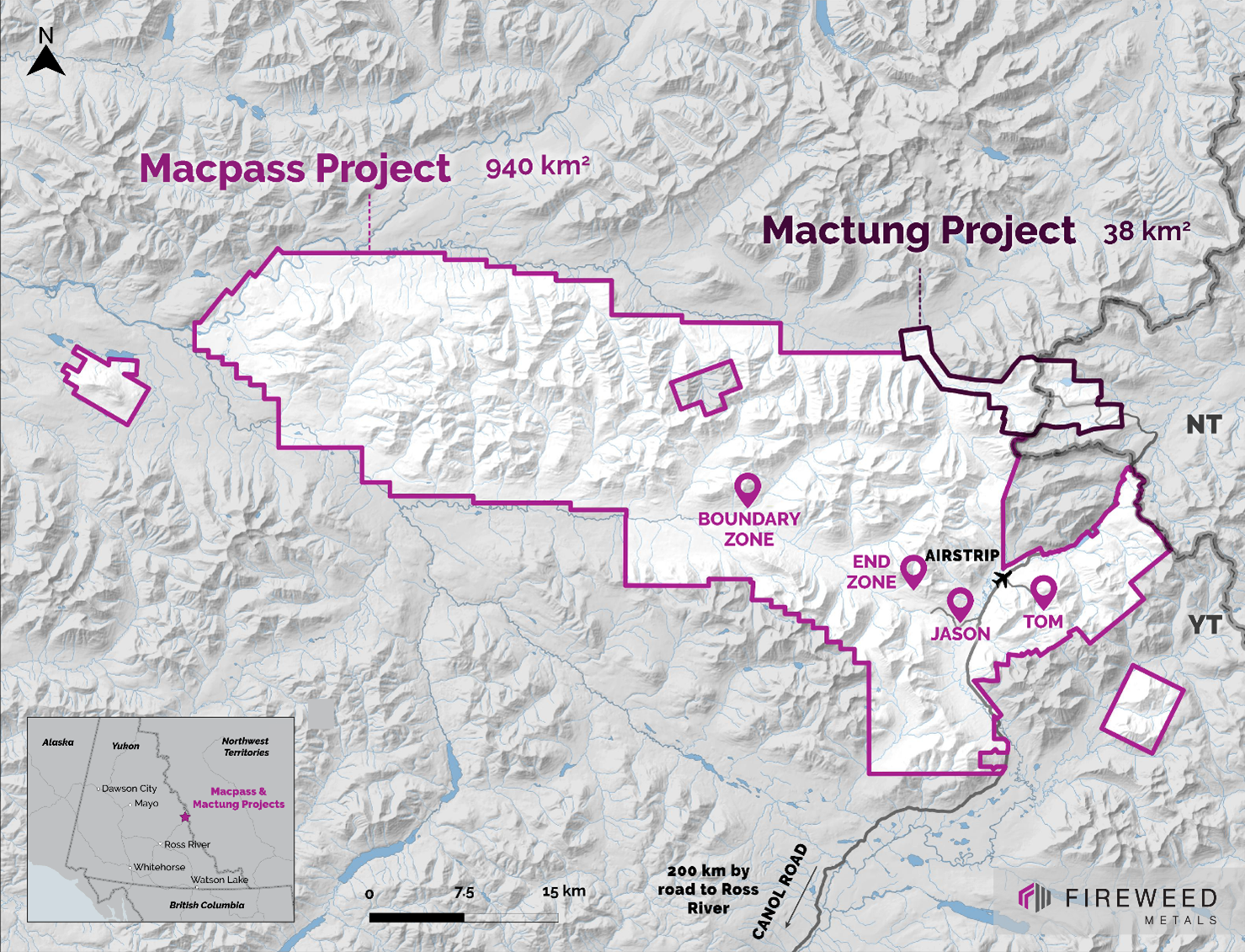 Map 1: Macpass Project and Mactung Project locations.
Map 1: Macpass Project and Mactung Project locations.
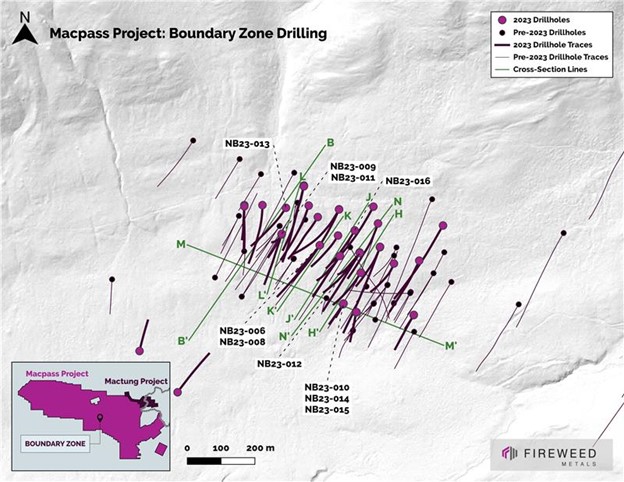 Map 2: Location of 2023 Boundary Zone drillholes, cross sections and long section M–M’. See below for sections.
Map 2: Location of 2023 Boundary Zone drillholes, cross sections and long section M–M’. See below for sections.
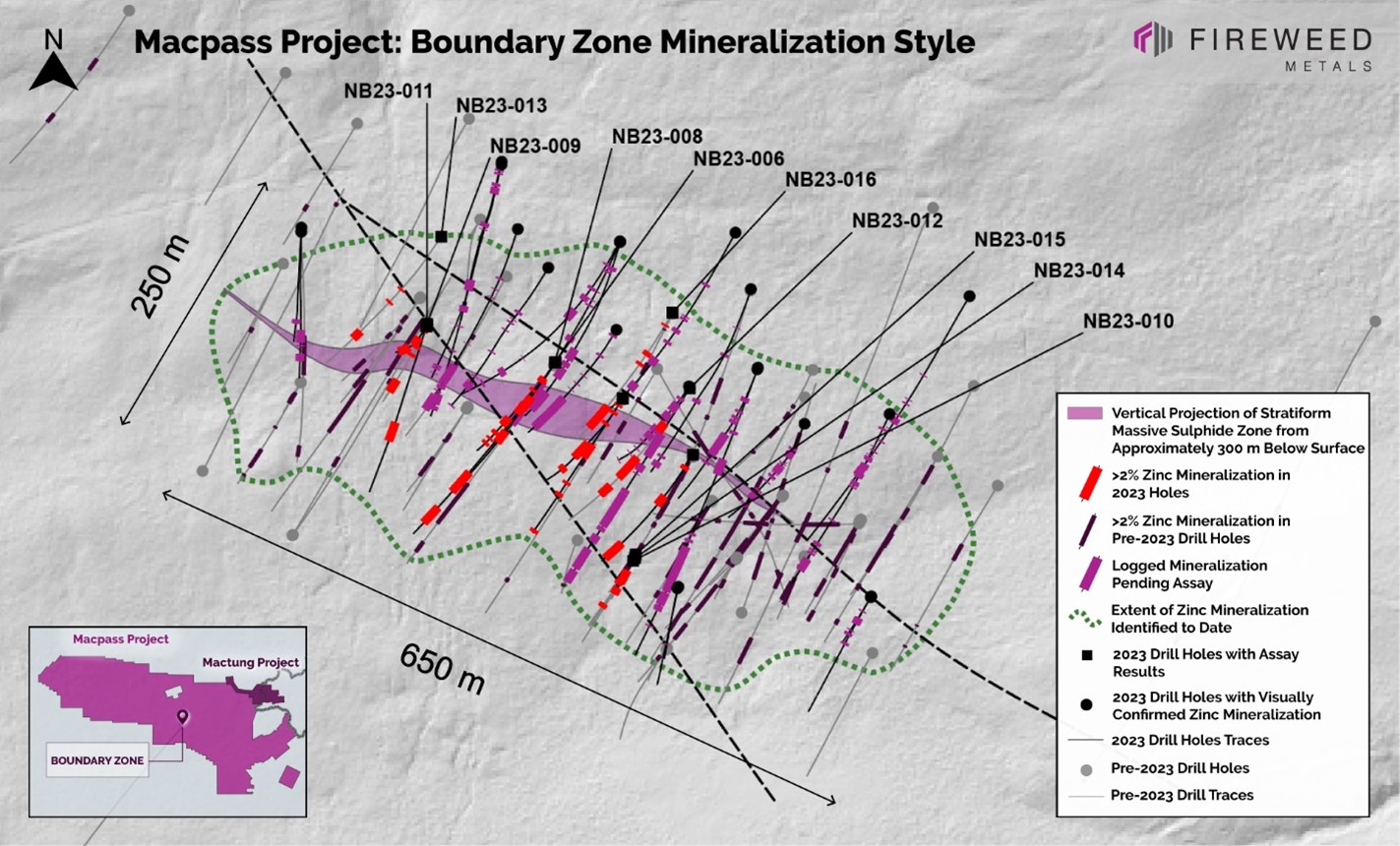 Map 3: Mineralized intervals in 2023 drilling and pre-2023 drilling defining a stratiform laminated to massive sulphide zone that is connected at depth (purple polygon) and a broader envelope of vein, breccia, and other stratiform zinc mineralization, showing significant areal extent (within green dashed line).
Map 3: Mineralized intervals in 2023 drilling and pre-2023 drilling defining a stratiform laminated to massive sulphide zone that is connected at depth (purple polygon) and a broader envelope of vein, breccia, and other stratiform zinc mineralization, showing significant areal extent (within green dashed line).
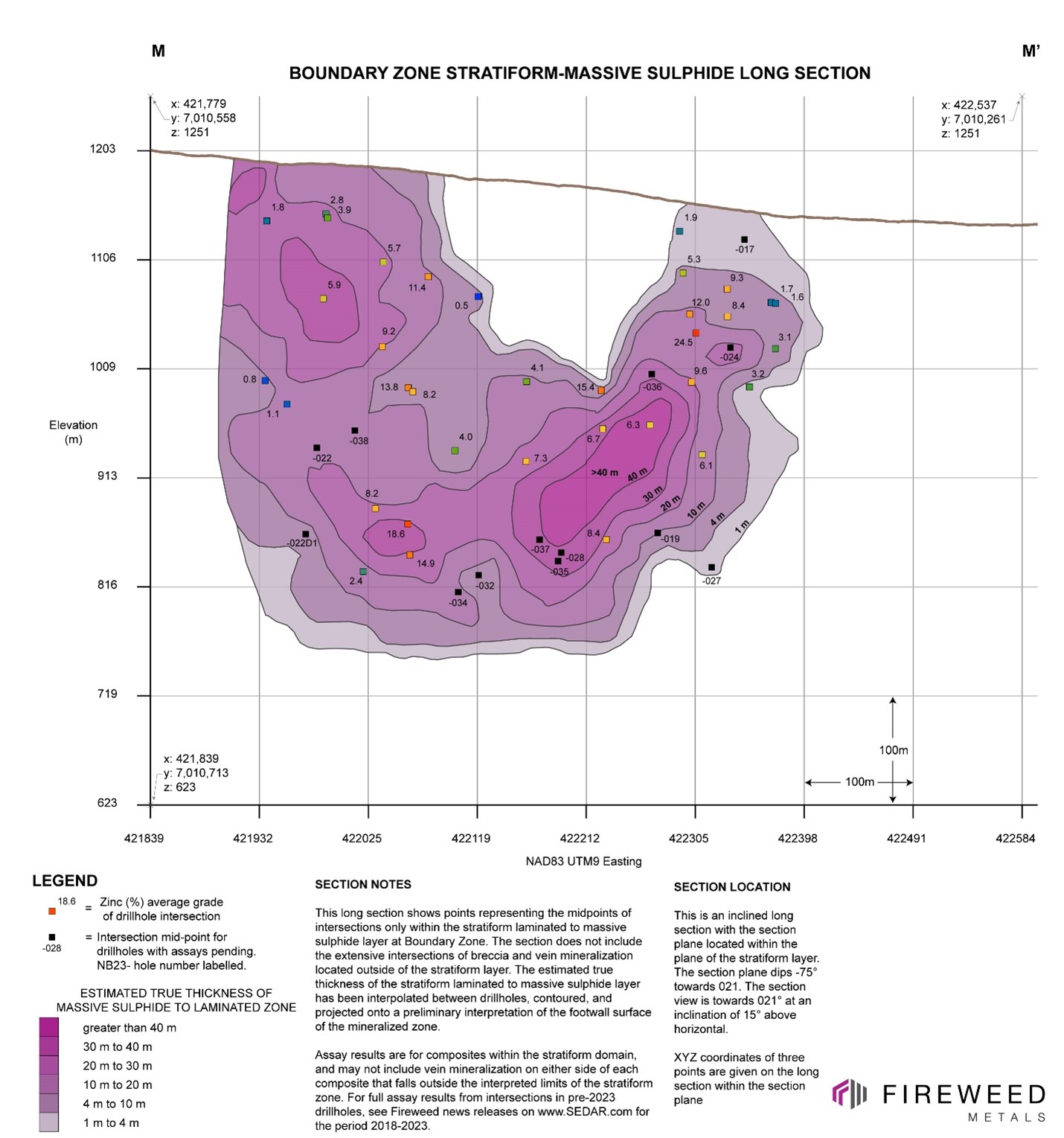 Long Section M–M’ – Estimated true thickness interpretation and selected intersections with zinc grades shown within the laminated to massive sulphide stratiform zone of pyrite-sphalerite-galena mineralization at Boundary Zone including midpoints of holes with assays pending.
Long Section M–M’ – Estimated true thickness interpretation and selected intersections with zinc grades shown within the laminated to massive sulphide stratiform zone of pyrite-sphalerite-galena mineralization at Boundary Zone including midpoints of holes with assays pending.
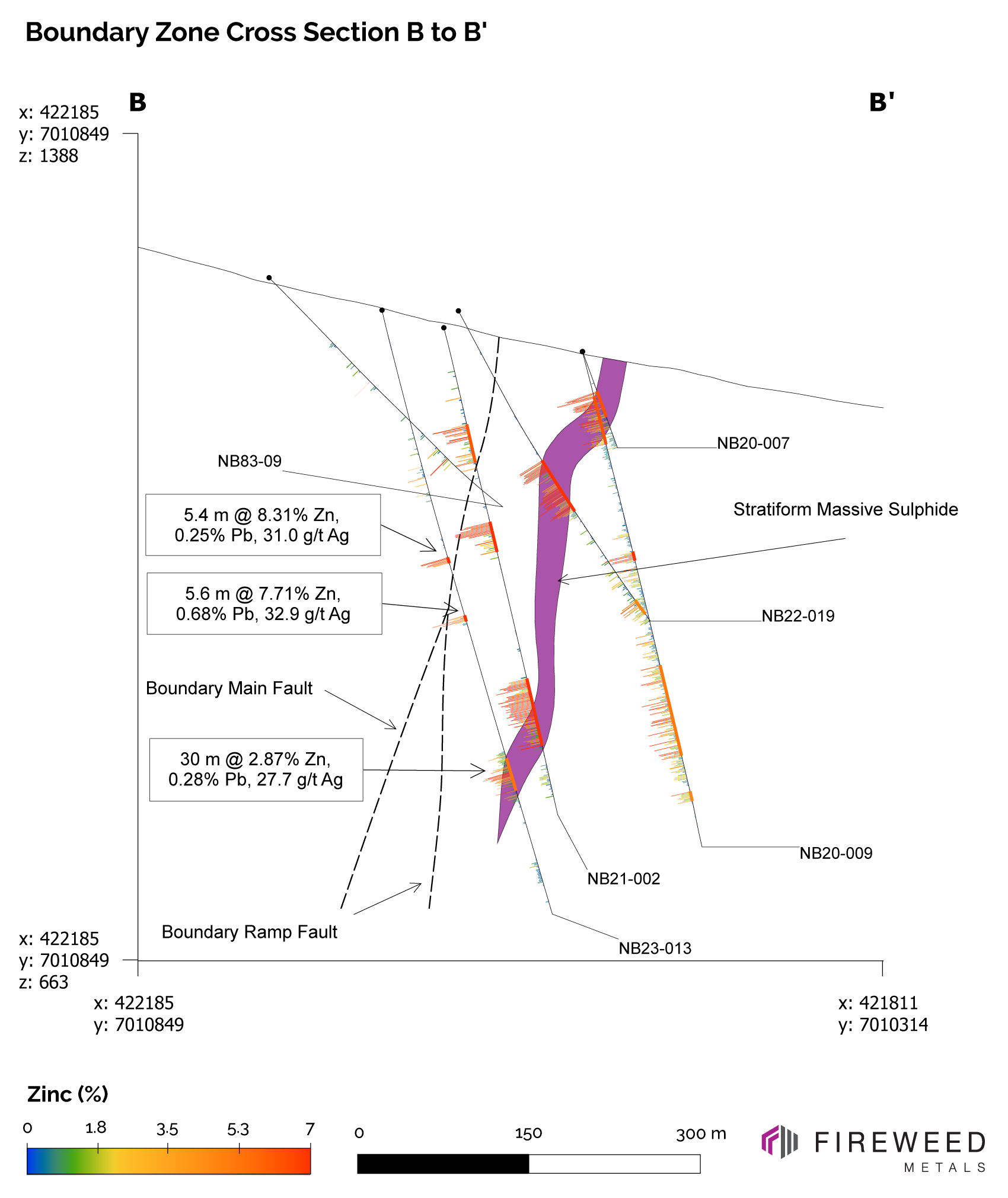 Cross Section B–B’ — Including analytical results for holes NB23-013.
Cross Section B–B’ — Including analytical results for holes NB23-013.
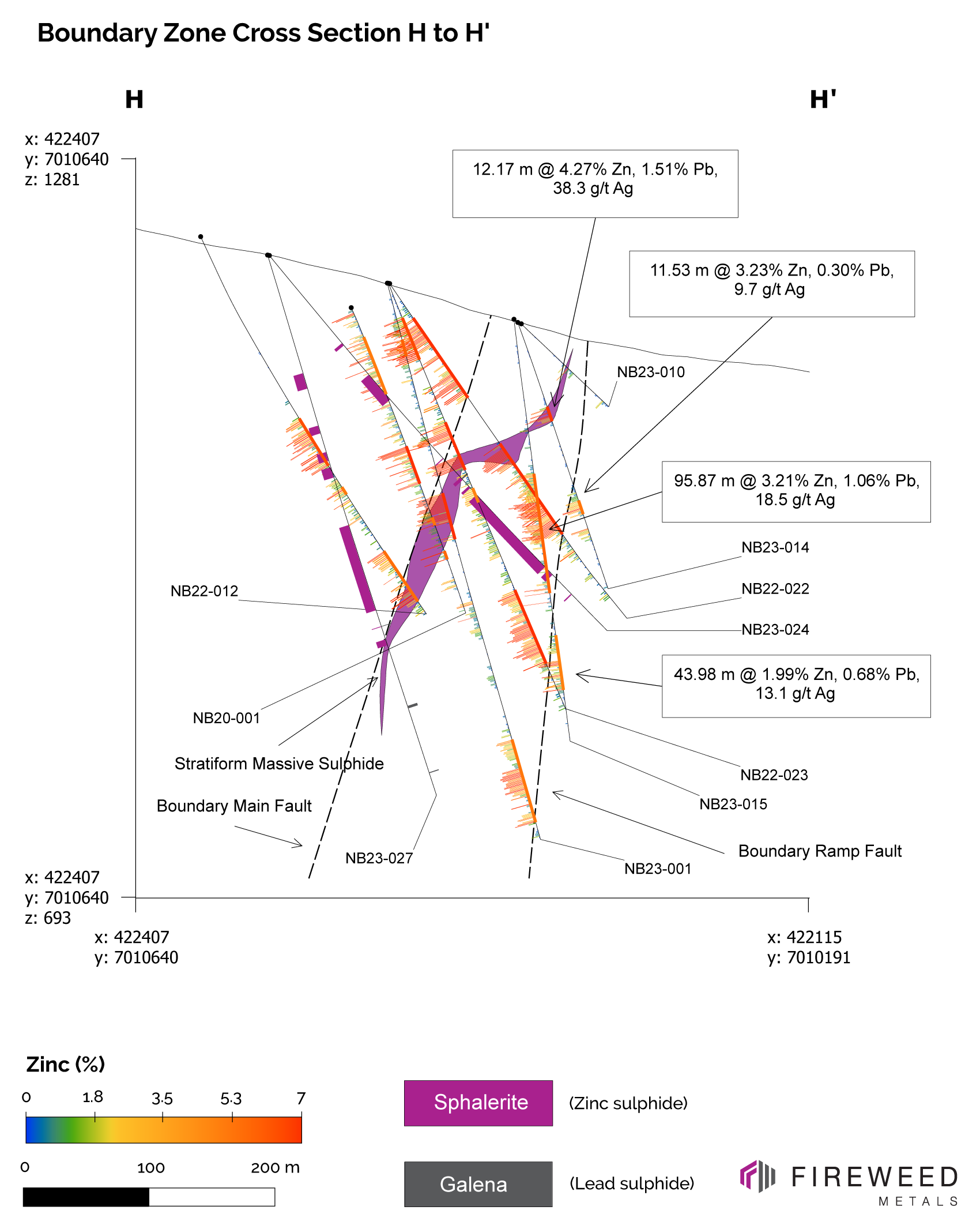 Cross Section H–H’ — Including analytical results for holes NB23-014 and NB23-015.
Cross Section H–H’ — Including analytical results for holes NB23-014 and NB23-015.
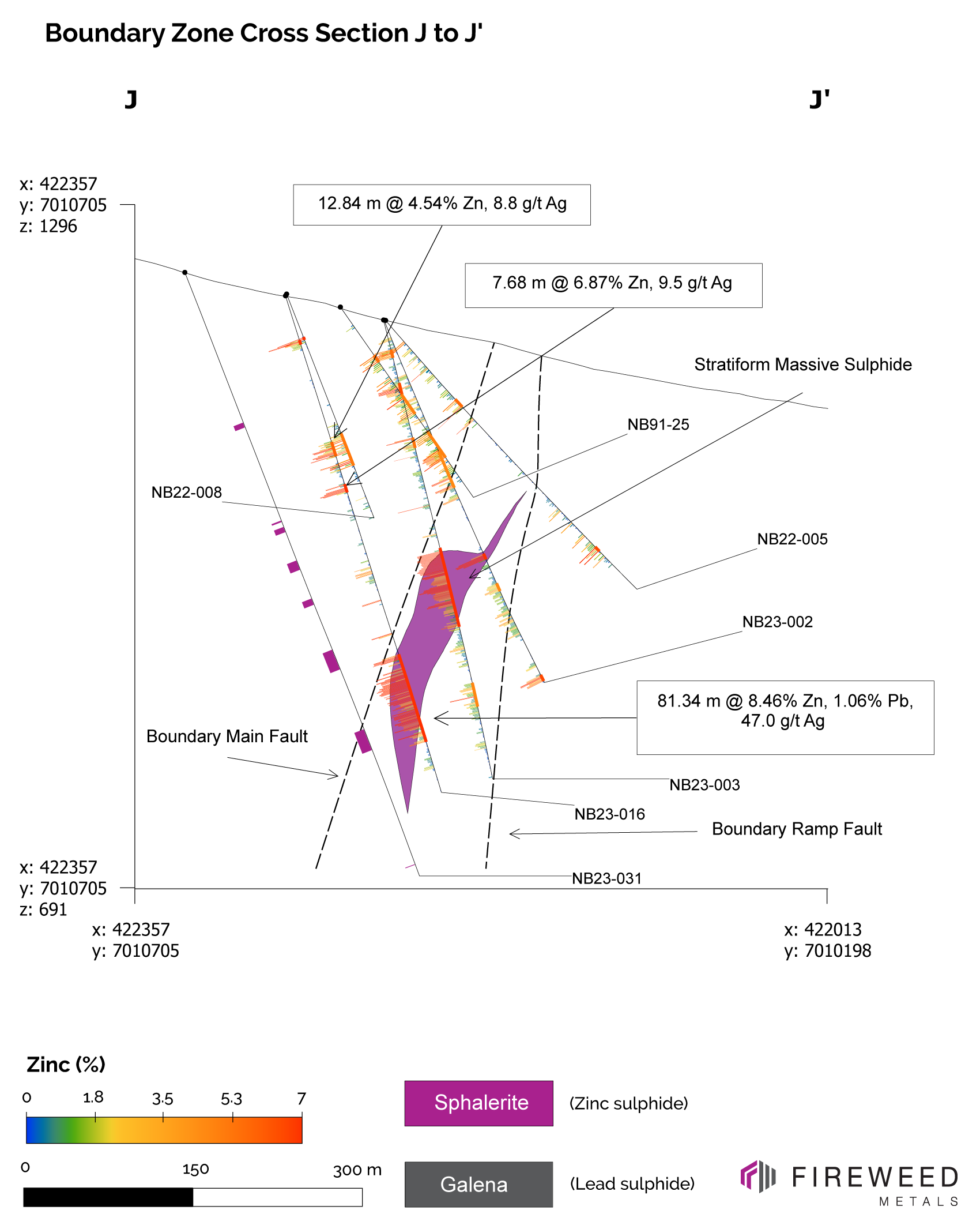 Cross Section J–J’ — Including analytical results for holes NB23-016.
Cross Section J–J’ — Including analytical results for holes NB23-016.
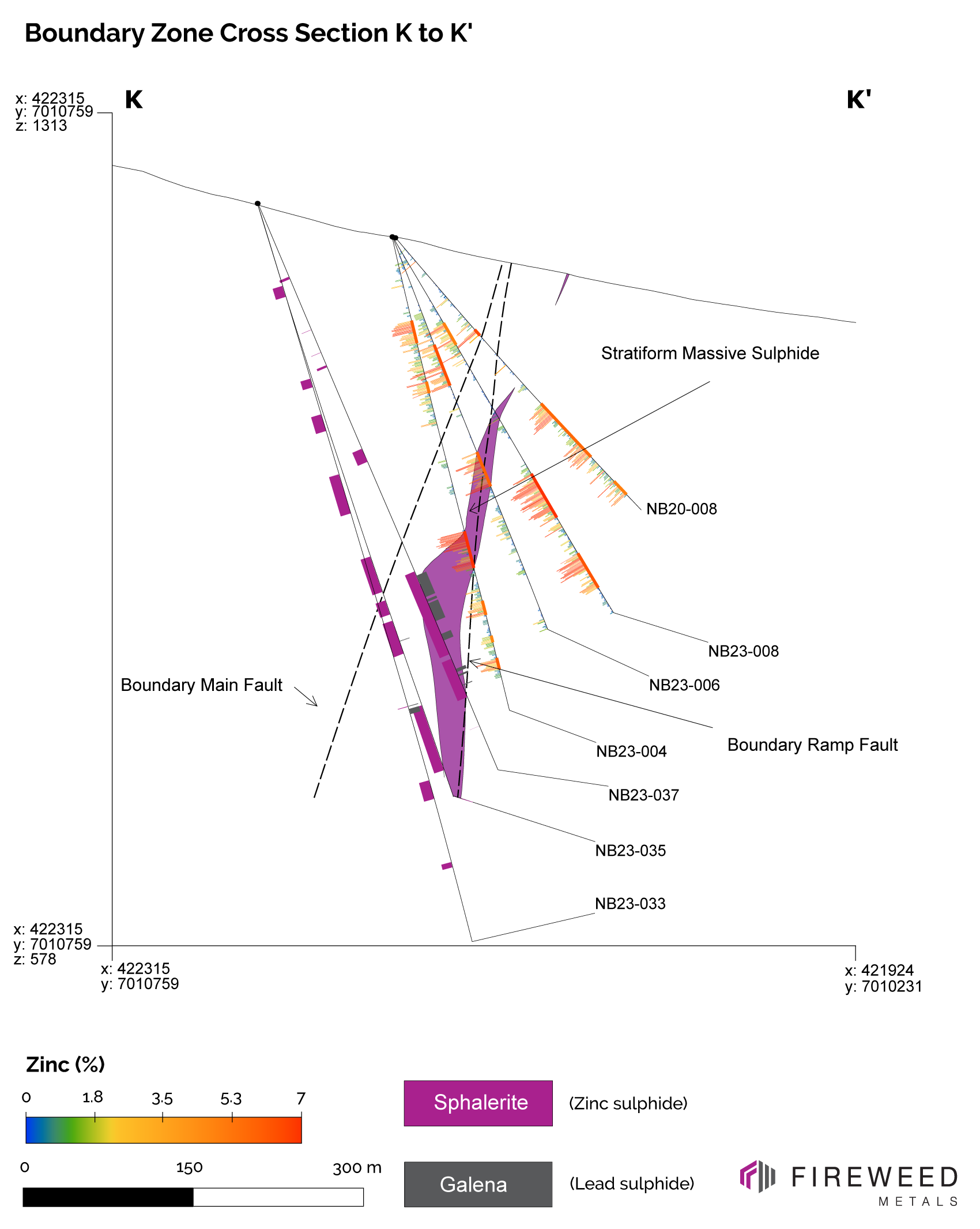 Cross Section K–K’ — Including Holes NB23-004, NB23-006, and NB23-008.
Cross Section K–K’ — Including Holes NB23-004, NB23-006, and NB23-008.
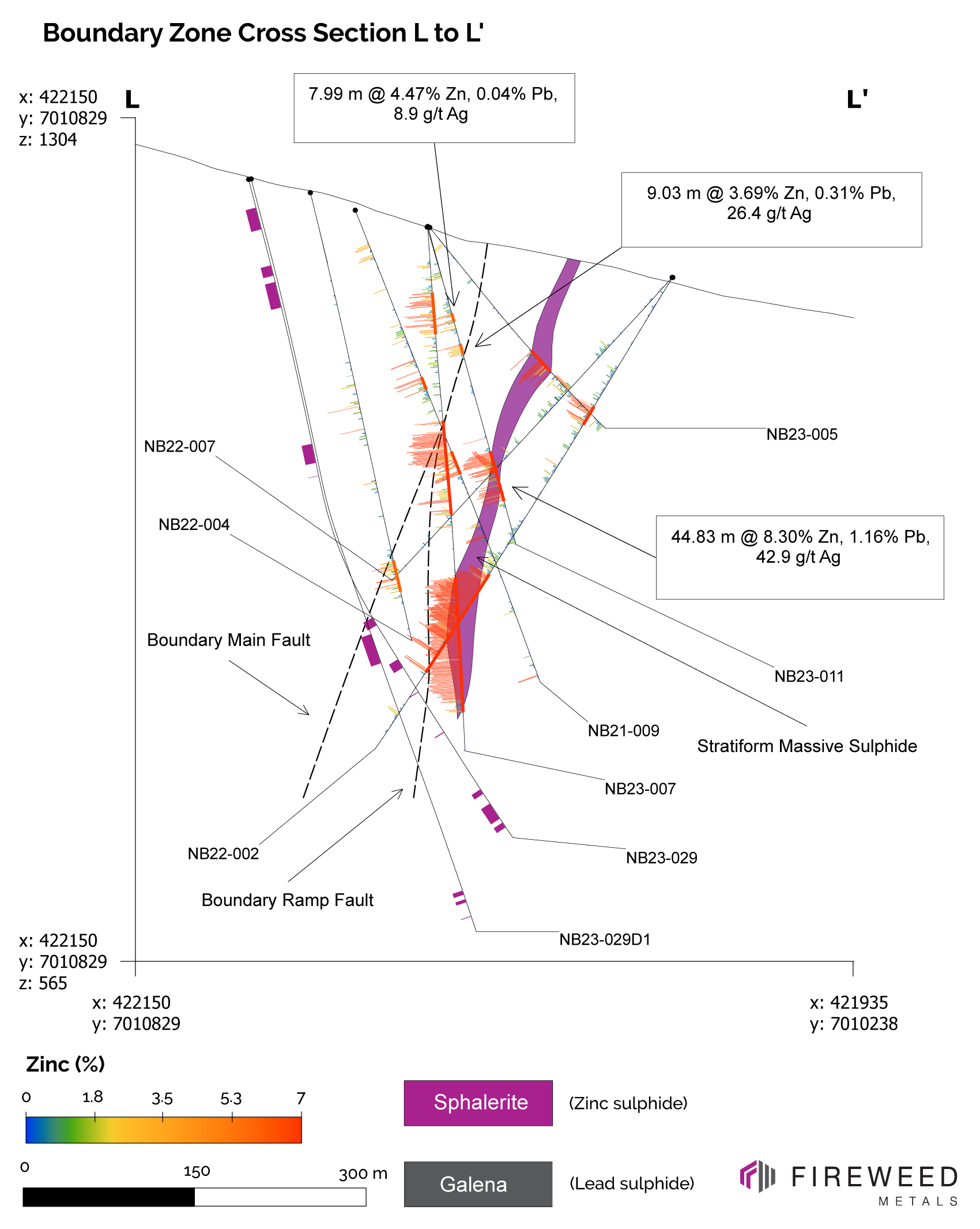 Cross Section L–L’ — Including analytical results from Hole NB23-011
Cross Section L–L’ — Including analytical results from Hole NB23-011
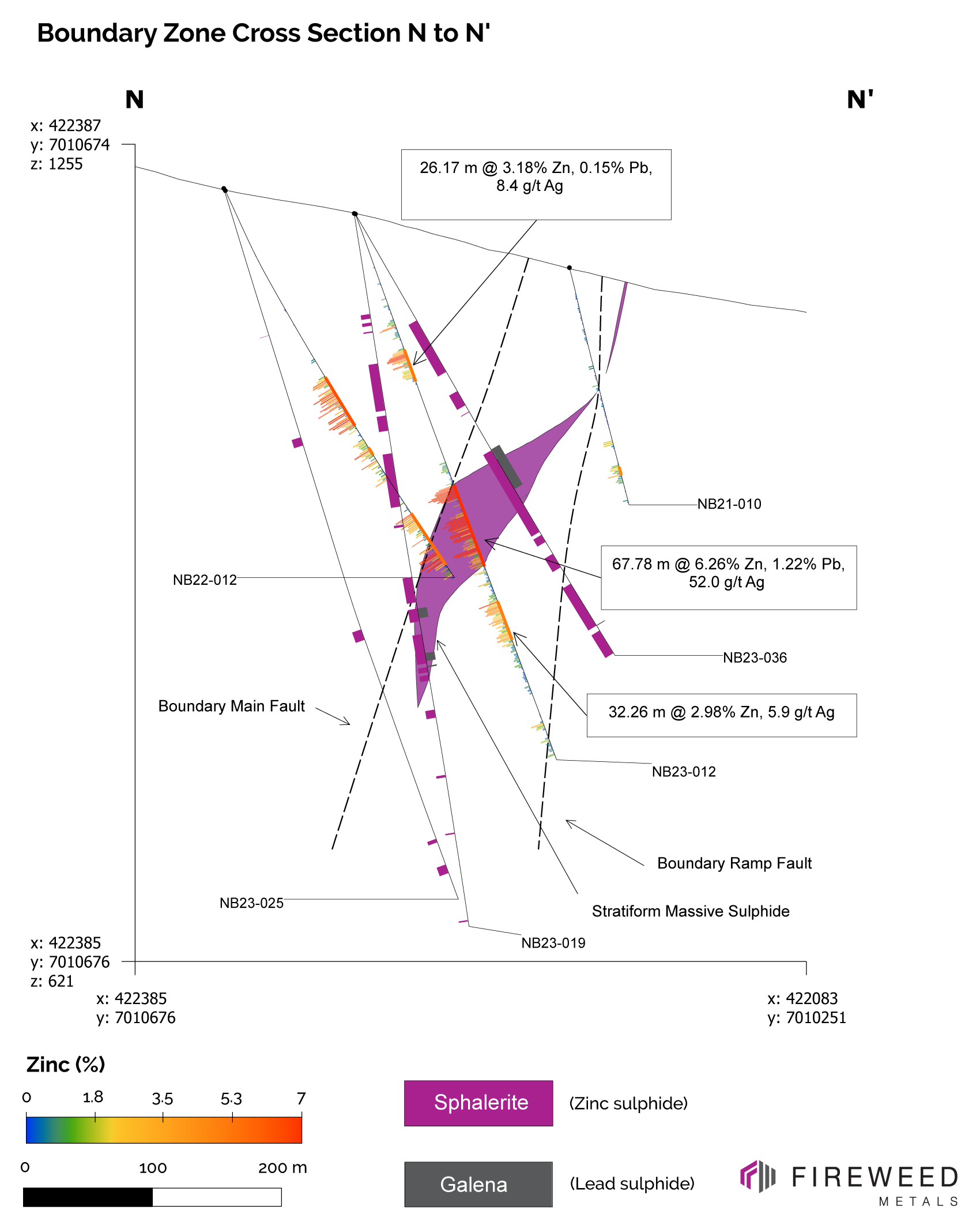 Cross Section N–N’ — Including analytical results from Hole NB23-012
Cross Section N–N’ — Including analytical results from Hole NB23-012
 Photo 1: High resolution core scanning image of stratiform and massive to semi-massive sulphide mineralization in NB23-016 (351.1 m to 360.4 m).
Photo 1: High resolution core scanning image of stratiform and massive to semi-massive sulphide mineralization in NB23-016 (351.1 m to 360.4 m).
 Photo 2: High resolution core scanning image of sphalerite-pyrite-siderite vein and matrix replacement mineralization in NB23-016 (172.1 m to 182.0 m).
Photo 2: High resolution core scanning image of sphalerite-pyrite-siderite vein and matrix replacement mineralization in NB23-016 (172.1 m to 182.0 m).
 Photo 3: High resolution core scanning image of sphalerite-pyrite-galena-siderite breccia, vein and replacement mineralization in NB23-015 (142.8 m to 152.8 m).
Photo 3: High resolution core scanning image of sphalerite-pyrite-galena-siderite breccia, vein and replacement mineralization in NB23-015 (142.8 m to 152.8 m).
Table 2: NB23-006, NB23-008, NB23-009, NB23-010, and NB23-011, NB23-012, NB23-013, NB23-014, NB23-015, NB23-016 Drill Results.
|
Drillhole |
Interval |
From (m) |
To (m) |
Interval Width (m) |
Est. True Width (m) |
Zinc (%) |
Lead (%) |
Silver (g/t) |
Bulk Density (t/m3) |
|
NB23-006** |
Entire Hole† |
0.0 |
373.0 |
373.00 |
N/A |
1.23 |
0.05 |
4.0 |
3.0 |
|
NB23-008** |
Entire Hole† |
0.0 |
385.0 |
385.00 |
N/A |
1.80 |
0.07 |
4.9 |
3.1 |
|
NB23-009 |
Entire Hole†* |
0.0 |
67.0 |
67.00 |
ABANDONED |
– |
– |
– |
– |
|
NB23-010 |
Entire Hole†* |
0.0 |
96.0 |
96.00 |
N/A |
0.19 |
0.08 |
2.1 |
2.8 |
|
NB23-011 |
Entire Hole† |
0.0 |
290.9 |
290.93 |
N/A |
1.84 |
0.24 |
10.4 |
2.9 |
|
NB23-011 |
Primary |
78.4 |
86.4 |
7.99 |
N/A |
4.47 |
0.04 |
8.9 |
3.2 |
|
NB23-011 |
Primary* |
106.7 |
115.8 |
9.03 |
N/A |
3.69 |
0.31 |
26.4 |
3.0 |
|
NB23-011 |
Including |
204.5 |
249.3 |
44.83 |
N/A |
8.30 |
1.16 |
42.9 |
3.2 |
|
NB23-011 |
Primary |
204.5 |
249.3 |
44.83 |
8.5 |
8.30 |
1.16 |
42.9 |
3.2 |
|
NB23-011 |
Including |
204.5 |
223.3 |
18.83 |
3.6 |
12.24 |
1.29 |
63.9 |
3.5 |
|
NB23-011 |
>Including |
208.5 |
214.5 |
6.00 |
1.1 |
20.71 |
2.27 |
107.8 |
3.5 |
|
NB23-011 |
Primary |
237.3 |
242.3 |
5.00 |
N/A |
9.51 |
2.96 |
56.3 |
3.1 |
|
NB23-012 |
Entire Hole† |
0.0 |
452.0 |
452.00 |
N/A |
1.77 |
0.27 |
13.7 |
3.1 |
|
NB23-012 |
Primary |
111.8 |
138.0 |
26.17 |
N/A |
3.18 |
0.15 |
8.4 |
2.9 |
|
NB23-012 |
Primary |
114.4 |
120.1 |
5.61 |
N/A |
7.06 |
0.04 |
7.2 |
3.0 |
|
NB23-012 |
Primary |
138.0 |
223.5 |
85.50 |
N/A |
0.12 |
0.01 |
0.5 |
2.8 |
|
NB23-012 |
Primary |
223.5 |
291.3 |
67.78 |
41 |
6.26 |
1.22 |
52.0 |
3.9 |
|
NB23-012 |
Including |
223.5 |
279.1 |
55.57 |
36 |
7.18 |
1.44 |
57.1 |
3.9 |
|
NB23-012 |
>Including |
223.5 |
234.0 |
10.52 |
6.3 |
12.79 |
2.30 |
105.7 |
3.8 |
|
NB23-012 |
>>Including |
225.5 |
231.0 |
5.52 |
3.3 |
16.72 |
3.14 |
136.2 |
4.0 |
|
NB23-012 |
Primary |
249.0 |
278.1 |
29.07 |
N/A |
8.13 |
1.72 |
57.3 |
4.0 |
|
NB23-012 |
Primary |
291.3 |
320.1 |
28.86 |
N/A |
0.79 |
0.07 |
7.8 |
3.0 |
|
NB23-012 |
Primary |
320.1 |
352.4 |
32.26 |
N/A |
2.98 |
0.05 |
5.9 |
3.0 |
|
NB23-012 |
Including |
320.1 |
328.5 |
8.36 |
N/A |
4.59 |
0.05 |
8.3 |
3.1 |
|
NB23-013 |
Entire Hole† |
0.0 |
551.0 |
551.00 |
N/A |
0.52 |
0.06 |
5.5 |
3.0 |
|
NB23-013 |
Primary |
224.4 |
229.7 |
5.35 |
N/A |
8.31 |
0.25 |
31.0 |
4.3 |
|
NB23-013 |
Primary |
224.4 |
229.7 |
5.35 |
N/A |
8.31 |
0.25 |
31.0 |
4.3 |
|
NB23-013 |
Primary |
277.5 |
283.0 |
5.55 |
N/A |
7.71 |
0.68 |
32.9 |
3.4 |
|
NB23-013 |
Primary |
277.5 |
282.0 |
4.55 |
N/A |
8.86 |
0.79 |
37.4 |
3.4 |
|
NB23-013 |
Primary |
408.1 |
437.9 |
29.77 |
20 |
2.87 |
0.28 |
27.7 |
4.3 |
|
NB23-013 |
Including |
415.5 |
427.2 |
11.66 |
7.8 |
4.80 |
0.53 |
37.0 |
4.7 |
|
NB23-014 |
Entire Hole† |
0.0 |
224.0 |
224.00 |
N/A |
0.62 |
0.20 |
5.8 |
2.9 |
|
NB23-014 |
Primary |
71.1 |
83.3 |
12.17 |
N/A |
4.27 |
1.51 |
38.3 |
3.4 |
|
NB23-014 |
Including |
78.0 |
83.3 |
5.27 |
N/A |
6.69 |
2.96 |
66.2 |
3.3 |
|
NB23-014 |
Primary |
149.9 |
161.4 |
11.53 |
N/A |
3.23 |
0.30 |
9.7 |
3.3 |
|
NB23-015 |
Entire Hole† |
0.0 |
339.0 |
339.00 |
N/A |
1.32 |
0.45 |
8.9 |
3.0 |
|
NB23-015 |
Primary |
124.1 |
220.0 |
95.87 |
N/A |
3.21 |
1.06 |
18.5 |
3.1 |
|
NB23-015 |
Including |
141.5 |
176.5 |
34.98 |
N/A |
5.97 |
1.87 |
28.3 |
3.0 |
|
NB23-015 |
>Including |
146.9 |
157.5 |
10.63 |
N/A |
10.51 |
4.90 |
64.6 |
3.1 |
|
NB23-015 |
Including |
215.7 |
220.0 |
4.26 |
N/A |
6.08 |
4.35 |
78.6 |
3.7 |
|
NB23-015 |
Primary |
253.9 |
297.8 |
43.98 |
N/A |
1.99 |
0.68 |
13.1 |
3.3 |
|
NB23-015 |
Including |
274.0 |
278.0 |
3.94 |
N/A |
7.00 |
0.55 |
14.7 |
3.1 |
|
NB23-016 |
Entire Hole† |
0.0 |
461.0 |
461.00 |
N/A |
2.38 |
0.25 |
12.8 |
3.0 |
|
NB23-016 |
Primary |
41.1 |
45.3 |
4.20 |
N/A |
10.01 |
0.25 |
30.1 |
3.6 |
|
NB23-016 |
Primary |
42.2 |
44.1 |
1.92 |
N/A |
16.96 |
0.38 |
46.8 |
4.2 |
|
NB23-016 |
Primary |
135.8 |
148.6 |
12.84 |
N/A |
4.54 |
0.07 |
8.8 |
3.6 |
|
NB23-016 |
Primary |
140.8 |
148.6 |
7.84 |
N/A |
5.93 |
0.06 |
9.9 |
3.6 |
|
NB23-016 |
Primary |
174.8 |
182.5 |
7.68 |
N/A |
6.87 |
0.01 |
9.5 |
2.9 |
|
NB23-016 |
Primary |
177.7 |
181.5 |
3.74 |
N/A |
11.01 |
0.02 |
14.7 |
3.0 |
|
NB23-016 |
Primary |
332.9 |
414.2 |
81.34 |
35 |
8.46 |
1.06 |
47.0 |
3.7 |
|
NB23-016 |
Including |
332.9 |
405.9 |
73.02 |
31 |
9.02 |
1.13 |
50.1 |
3.7 |
|
NB23-016 |
>Including |
332.9 |
337.5 |
4.62 |
2.0 |
12.07 |
1.44 |
72.5 |
4.2 |
|
NB23-016 |
>Including |
349.0 |
399.0 |
50.04 |
21 |
10.74 |
1.35 |
55.6 |
3.8 |
|
NB23-016 |
>>Including |
352.0 |
364.4 |
12.39 |
5.3 |
17.22 |
2.04 |
79.1 |
4.2 |
* Denotes intervals with recovery of less than 85%
** Individual intercepts reported in a previous release
† Entire hole intervals contain large continuous sections of very low grade or not mineralized material (below 2% zinc)—intersections of continuous higher-grade material (>2% zinc) are listed as Primary and Included intervals and represent mineralized material.
‡ See “Data Verification” for a description of true width calculations
Table 3: 2023 Drilling Summary.
|
Drillhole |
Length (m) |
Zone |
Significant Intersection |
Type |
|
NB23-001 |
460 |
Boundary |
Results disclosed Jul 26 |
Step Out |
|
NB23-002 |
351 |
Boundary |
Results disclosed Jul 26 |
Step Out |
|
NB23-003 |
418 |
Boundary |
Results disclosed Jul 26 |
Step Out |
|
NB23-004 |
432 |
Boundary |
Results disclosed Aug 22 |
Step Out |
|
NB23-005 |
234 |
Boundary |
Results disclosed Aug 22 |
Step Out |
|
NB23-006 |
373 |
Boundary |
Results disclosed Aug 22 |
Step Out |
|
NB23-007 |
461 |
Boundary |
Results disclosed Aug 22 |
Step Out |
|
NB23-008 |
385 |
Boundary |
Results disclosed Aug 22 |
Step Out |
|
NB23-009 |
67 |
Boundary |
Hole abandoned and redrilled as NB23-011 |
Step Out |
|
NB23-010 |
96 |
Boundary |
Results disclosed in this release |
Step Out |
|
NB23-011 |
289 |
Boundary |
Results disclosed in this release |
Step Out |
|
NB23-012 |
452 |
Boundary |
Results disclosed in this release |
Step Out |
|
NB23-013 |
551 |
Boundary |
Results disclosed in this release |
Step Out |
|
NB23-014 |
223 |
Boundary |
Results disclosed in this release |
Step Out |
|
NB23-015 |
339 |
Boundary |
Results disclosed in this release |
Step Out |
|
NB23-016 |
460 |
Boundary |
Results disclosed in this release |
Step Out |
|
NB23-017 |
96 |
Boundary |
Narrow Zone Encountered |
Step Out |
|
NB23-018 |
195 |
Boundary |
Moderate Zone Encountered |
Step Out |
|
NB23-019 |
560 |
Boundary |
Wide Zone Encountered |
Step Out |
|
NB23-020 |
414 |
Boundary |
Wide Zone Encountered |
Infill |
|
NB23-021 |
442 |
Boundary |
Wide Zone Encountered |
Infill |
|
NB23-022 |
386 |
Boundary |
Wide Zone Encountered |
Step Out |
|
NB23-022D1 |
448 |
Boundary |
Narrow Zone Encountered |
Step Out |
|
NB23-023 |
181 |
Boundary |
Moderate Zone Encountered |
Step Out |
|
NB23-024 |
402 |
Boundary |
Wide Zone Encountered |
Infill |
|
NB23-025 |
580 |
Boundary |
Moderate Zone Encountered |
Step Out |
|
NB23-026 |
111 |
Boundary |
Narrow Zone Encountered |
Step Out |
|
NB23-027 |
396 |
Boundary |
Wide Zone Encountered |
Infill |
|
NB23-028 |
477 |
Boundary |
Wide Zone Encountered |
Step Out |
|
NB23-029 |
640 |
Boundary |
Wide Zone Encountered |
Step Out |
|
NB23-029D1 |
689 |
Boundary |
Narrow Zone Encountered |
Step Out |
|
NB23-030 |
526 |
Boundary |
Wide Zone Encountered |
Step Out |
|
NB23-031 |
574 |
Boundary |
Moderate Zone Encountered |
Step Out |
|
NB23-032 |
495 |
Boundary |
Moderate Zone Encountered |
Step Out |
|
NB23-033 |
681 |
Boundary |
Narrow Zone Encountered |
Step Out |
|
NB23-034 |
580 |
Boundary |
Wide Zone Encountered |
Step Out |
|
NB23-035 |
552 |
Boundary |
Moderate Zone Encountered |
Step Out |
|
NB23-036 |
397 |
Boundary |
Wide Zone Encountered |
Step Out |
|
NB23-037 |
544 |
Boundary |
Wide Zone Encountered |
Step Out |
|
NB23-038 |
427 |
Boundary |
Moderate Zone Encountered |
Step Out |
|
TS23-001 |
143 |
Tom North |
Minor Mineralization Encountered |
Step Out |
|
TS23-002 |
182 |
Tom North |
Minor Mineralization Encountered |
Step Out |
|
TS23-003 |
299 |
Tom West |
Wide Zone Encountered |
Step Out |
|
TS23-004 |
369 |
Tom West |
Moderate Zone Encountered |
Step Out |
|
TS23-005 |
407 |
Tom West |
Moderate Zone Encountered |
Step Out |
|
TS23-006 |
137 |
Tom West |
Moderate Zone Encountered |
Step Out |
|
TS23-007 |
215 |
Tom West |
Moderate Zone Encountered |
Step Out |
|
TS23-008 |
428 |
Tom West |
Moderate Zone Encountered |
Step Out |
|
TS23-009 |
749 |
Tom South |
Wide Zone Encountered |
Step Out |
|
TS23-009D1 |
747 |
Tom South |
Wide Zone Encountered |
Redrill |
|
TS23-009D2 |
821 |
Tom South |
Wide Zone Encountered |
Step Out |
|
JS23-001 |
631 |
Jason South |
Narrow Zone Encountered |
Step Out |
|
JS23-001D1 |
665 |
Jason South |
Wide Zone Encountered |
Step Out |
|
BX23-001 |
219 |
Boundary South |
No significant mineralization |
Exploration |
|
BX23-002 |
144 |
Boundary South |
No significant mineralization |
Exploration |
|
KB23-001 |
368 |
Kobuk |
No significant mineralization |
Exploration |
|
KB23-002 |
284 |
Kobuk |
No significant mineralization |
Exploration |
Table 4: Drill Hole Collar Information
|
Drillhole |
Zone |
Length (m) |
Easting |
Northing |
Elevation (m.s.l) |
Azimuth (°) |
Dip (°) |
|
NB23-001 |
Boundary |
460 |
422297 |
7010471 |
1185.86 |
211.99 |
-76.42 |
|
NB23-002 |
Boundary |
351 |
422235 |
7010525 |
1194.57 |
214.06 |
-70.22 |
|
NB23-003 |
Boundary |
418 |
422235 |
7010525 |
1194.57 |
213.40 |
-78.00 |
|
NB23-004 |
Boundary |
432 |
422171 |
7010556 |
1203.00 |
213.91 |
-78.08 |
|
NB23-005 |
Boundary |
234 |
422058 |
7010589 |
1207.95 |
199.63 |
-49.74 |
|
NB23-006 |
Boundary |
373 |
422171 |
7010556 |
1203.00 |
215.44 |
-70.02 |
|
NB23-007 |
Boundary |
461 |
422058 |
7010589 |
1207.95 |
206.37 |
-86.43 |
|
NB23-008 |
Boundary |
385 |
422171 |
7010556 |
1203.00 |
215.83 |
-60.07 |
|
NB23-009 |
Boundary |
67 |
422058 |
7010589 |
1208.67 |
198.54 |
-75.41 |
|
NB23-010 |
Boundary |
96 |
422241 |
7010385 |
1150.41 |
212.28 |
-45.00 |
|
NB23-011 |
Boundary |
289 |
422058 |
7010589 |
1208.67 |
201.59 |
-75.40 |
|
NB23-012 |
Boundary |
452 |
422289 |
7010534 |
1200.90 |
211.75 |
-69.90 |
|
NB23-013 |
Boundary |
551 |
422072 |
7010666 |
1233.59 |
214.94 |
-77.68 |
|
NB23-014 |
Boundary |
223 |
422241 |
7010384 |
1150.86 |
213.68 |
-70.83 |
|
NB23-015 |
Boundary |
339 |
422241 |
7010385 |
1150.41 |
213.36 |
-84.00 |
|
NB23-016 |
Boundary |
461 |
422274 |
7010600 |
1216. 70 |
209.88 |
-72.96 |
|
NB23-017 |
Boundary |
96 |
422279 |
7010359 |
1142.67 |
191.27 |
-46.90 |
|
NB23-018 |
Boundary |
195 |
422279 |
7010359 |
1142.67 |
190.21 |
-65.21 |
|
NB23-019 |
Boundary |
561 |
422289 |
7010534 |
1200.90 |
209.95 |
-81.31 |
|
NB23-020 |
Boundary |
414 |
422465 |
7010510 |
1191.44 |
204.85 |
-63.35 |
|
NB23-021 |
Boundary |
442 |
422391 |
7010500 |
1190.07 |
201.97 |
-77.01 |
|
NB23-022 |
Boundary |
386 |
421948 |
7010672 |
1232.44 |
178.85 |
-74.18 |
|
NB23-022D1 |
Boundary |
448 |
421948 |
7010672 |
1232.44 |
177.78 |
-74.00 |
|
NB23-023 |
Boundary |
181 |
422449 |
7010351 |
1145.42 |
211.82 |
-49.18 |
|
NB23-024 |
Boundary |
405 |
422348 |
7010550 |
1203.82 |
199.65 |
-50.18 |
|
NB23-025 |
Boundary |
582 |
422343 |
7010620 |
1219.03 |
196.94 |
-74.05 |
|
NB23-026 |
Boundary |
111 |
422449 |
7010351 |
1145.42 |
210.02 |
-65.44 |
|
NB23-027 |
Boundary |
451 |
422348 |
7010550 |
1203.82 |
197.18 |
-72.46 |
|
NB23-028 |
Boundary |
467 |
422222 |
7010587 |
1209.75 |
211.38 |
-65.44 |
|
NB23-029 |
Boundary |
630 |
422124 |
7010731 |
1250.31 |
196.21 |
-75.67 |
|
NB23-029D1 |
Boundary |
690 |
422124 |
7010731 |
1250.31 |
196.21 |
-75.67 |
|
NB23-030 |
Boundary |
526 |
422535 |
7010614 |
1214.65 |
211.44 |
-62.01 |
|
NB23-031 |
Boundary |
574 |
422329 |
7010671 |
1235.88 |
207.69 |
-69.87 |
|
NB23-032 |
Boundary |
493 |
422165 |
7010640 |
1224.09 |
210.08 |
-62.01 |
|
NB23-033 |
Boundary |
681 |
422228 |
7010663 |
1233.01 |
211.31 |
-73.88 |
|
NB23-034 |
Boundary |
580 |
422138 |
7010674 |
1237.24 |
199.07 |
-72.40 |
|
NB23-035 |
Boundary |
552 |
422228 |
7010663 |
1232.97 |
199.00 |
-72.02 |
|
NB23-036 |
Boundary |
398 |
422289 |
7010534 |
1200.89 |
212.26 |
-59.46 |
|
NB23-037 |
Boundary |
544 |
422228 |
7010663 |
1232.94 |
204.73 |
-66.10 |
|
NB23-038 |
Boundary |
427 |
422001 |
7010675 |
1233.60 |
179.75 |
-68.10 |
|
TS23-001 |
Tom North |
143 |
441761 |
7004226 |
1492.16 |
075.08 |
-49.66 |
|
TS23-002 |
Tom North |
182 |
441761 |
7004226 |
1492.16 |
074.97 |
-80.38 |
|
TS23-003 |
Tom West |
299 |
441676 |
7004024 |
1445.00 |
074.17 |
-68.51 |
|
TS23-004 |
Tom West |
369 |
441694 |
7003884 |
1463.34 |
067.38 |
-71.48 |
|
TS23-005 |
Tom West |
407 |
441761 |
7003770 |
1510.00 |
063.25 |
-75.35 |
|
TS23-006 |
Tom West |
137 |
441779 |
7004076 |
1485.36 |
065.15 |
-50.08 |
|
TS23-007 |
Tom West |
215 |
441779 |
7004076 |
1485.36 |
065.23 |
-78.04 |
|
TS23-008 |
Tom West |
428 |
441816 |
7003717 |
1538.00 |
089.53 |
-88.95 |
|
TS23-009 |
Tom South |
749 |
442363 |
7003106 |
1747.29 |
351.97 |
-82.00 |
|
TS23-009D1 |
Tom South |
748 |
442363 |
7003106 |
1747.29 |
351.97 |
-82.00 |
|
TS23-009D2 |
Tom South |
821 |
442363 |
7003106 |
1747.29 |
351.97 |
-82.00 |
|
JS23-001 |
Jason South |
631 |
436722 |
7002304 |
1185.00 |
228.15 |
-83.90 |
|
JS23-001D1 |
Jason South |
665 |
436722 |
7002304 |
1185.00 |
228.15 |
-83.90 |
|
BX23-001 |
Boundary Expl. |
219 |
421752 |
7010127 |
1114.70 |
035.16 |
-50.19 |
|
BX23-002 |
Boundary Expl. |
144 |
421637 |
7010243 |
1137.50 |
014.78 |
-49.83 |
|
KB23-001 |
Kobuk |
368 |
418651 |
7012138 |
1311.00 |
006.19 |
-51.12 |
|
KB23-002 |
Kobuk |
284 |
418754 |
7011620 |
1225.00 |
006.00 |
-65.24 |
Coordinates listed in NAD83 UTM Zone 9N.

